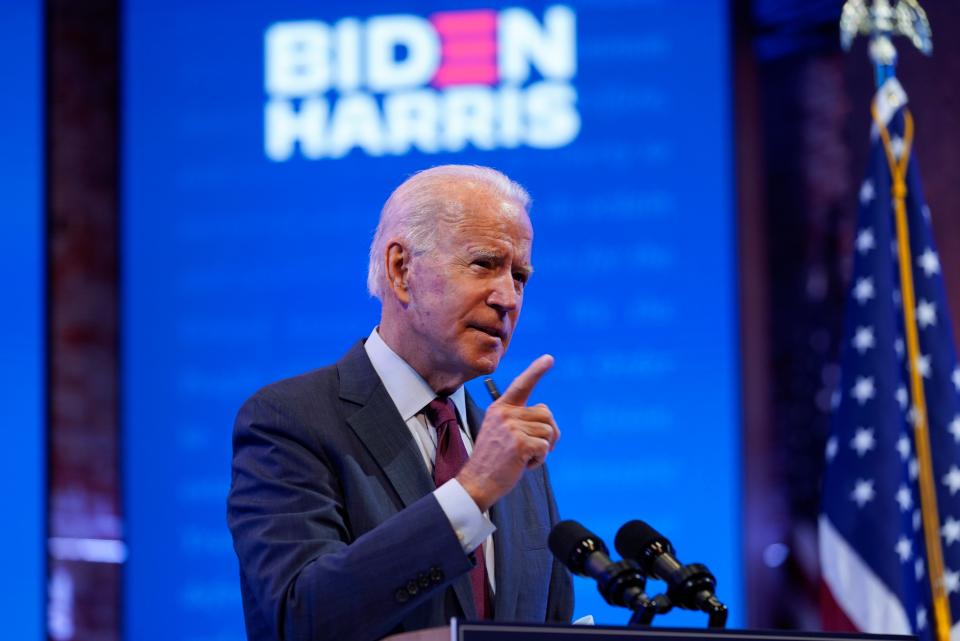What is the electoral college and how does it work? Trump's potential route to re-election explained

When Donald Trump won the last election, he did so in a uniquely American way: he lost the popular vote by nearly three million ballots, but he won the presidency thanks to the electoral college.
No other democratic nation fills its top job quite the way the US does according to the Pew Research Center, and only a handful are even similar.
Besides the US, the only other democracies that indirectly elect a leader who combines the roles of head of state and head of government are Botswana, Micronesia, the Marshall Islands, Nauru, South Africa and Suriname.
Donald Trump in 2012, convinced Mitt Romney would win the popular vote but lose the electoral college, tweeted on election night: “The electoral college is a disaster for a democracy.”
Even in the aftermath of his election victory, Mr Trump admitted it was a bizarre system.
“I would rather see it where you went with simple votes," he said in December 2016. "You know, you get 100 million votes and somebody else gets 90 million votes and you win.”
Here’s what you need to know about the electoral college, the calls for its elimination, and why it exists in the first place.
What is the electoral college and how does it work?
When voters cast their ballots on election day in America, they’re technically not voting directly for the candidates themselves. Instead, under the electoral college, they are essentially casting a ballot for their preferred candidate’s electors.
These electors are often party loyalists, or the individuals close to the campaigns. In all but two states, the winner of the popular vote receives all of that state’s electoral college votes — no matter the margin of victory.
All told, there are 538 electors in the electoral college: one for each member of the House of Representatives, two per senator, and three allocated to the District of Columbia through the 22nd Amendment.
So, after voters cast their ballots in November (and after governors of the states certify the tallies and electoral lists), the electors then meet in December in their respective states.
“Blue” states give all their electors to the Democrat, no matter how many Republicans voted for their candidate; vice versa in the “red” states.
At that point, they then officially vote for president and vice president. Members of the House and Senate then meet in January to take an official tally of those votes.
Why does the US do it this way?
The electoral college is a compromise solution dating back to the origins of the country, when considerable concern existed that urban centers would dominate elections to the detriment of less populated areas.
Because the number of electors a state has is tied to number of representatives, more populous states have an edge because they wield more by virtue of having greater representation in the House.

But, in order to offset that, the founders of the country determined that two electors would be allocated per senator — which each state has two of regardless of size — so less populous states are inherently given an extra boost.
So, for instance, Wyoming has three electoral college votes for its 532,000 citizens.
California, which has 36.7 million citizens, has 55 electoral college votes.
So California has 66 times as many people - but only 18 times as many electoral college votes.
Wyoming has about 188,000 voters per electoral vote, while California has 677,345 voters per electoral vote.
The procedure is detailed in the 12th Amendment of the United States Constitution.
James Madison, who helped conceive the electoral college at the Constitutional Convention, of 1787, later admitted that delegates had written the rules while impaired by “the hurrying influence produced by fatigue and impatience.”

In 1823 he wrote in a letter that states using the winner-take-all rule “are a string of beads” and fail to reflect the true political diversity of their citizens. He disliked the practice so much he called for a constitutional amendment barring it.
Who benefits?
In the two most recent elections in which candidates lost the popular vote but won the election anyway, the candidates were Republicans. George Bush won in 2000, while Donald Trump won in 2016.
Generally speaking, Republican support is found in rural areas of the country, while Democrats find their support in urban centers.
If you look at a map of nearly any election, the vast majority of the country will be painted red for Republicans no matter the vote — and that is because Republicans dominate in very sparsely populated areas of the US in the centre of the country.
Meanwhile, urban centers are concentrated on coasts and in relatively few states.
It effectively dilutes the votes of African-Americans, Latinos, and Asian-Americans, because they live disproportionately in populous states, which have less power in the college per capita.
How can it change?
Changing the system would require a constitutional amendment, which would is a drawn out process that requires an overwhelming amount of support across the country. It seems unlikely - neither Joe Biden nor Donald Trump are pushing for it.
In some states, though, governors have taken action and are pushing for laws that would award all of their electors to whoever won the popular vote, no matter what the result was in their state.
The National Popular Vote Interstate Compact, as it is known, has seen 15 states and the District of Columbia pass bills containing identical language pledging to cast their electoral votes for the presidential candidate who wins the most votes nationally.
Read more
Majority of Americans support abolishing Electoral College system in favour of popular vote
The US electoral college system is a failure and the founding fathers would agree
Donald Trump falsely claims he had 'biggest electoral college win since Ronald Reagan'

 Yahoo News
Yahoo News 